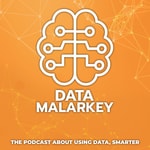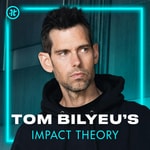The Data Malarkey Podcast – Details, episodes & analysis
Podcast details
Technical and general information from the podcast's RSS feed.

The Data Malarkey Podcast
Sam Knowles
Frequency: 1 episode/16d. Total Eps: 55

Recent rankings
Latest chart positions across Apple Podcasts and Spotify rankings.
Apple Podcasts
🇬🇧 Great Britain - marketing
24/07/2025#68🇬🇧 Great Britain - marketing
14/07/2025#55🇬🇧 Great Britain - marketing
10/07/2025#85🇬🇧 Great Britain - marketing
15/05/2025#100🇬🇧 Great Britain - marketing
18/04/2025#80🇬🇧 Great Britain - marketing
01/03/2025#73🇬🇧 Great Britain - marketing
21/02/2025#63🇬🇧 Great Britain - marketing
02/02/2025#71🇬🇧 Great Britain - marketing
05/12/2024#95🇬🇧 Great Britain - marketing
15/09/2024#86
Spotify
No recent rankings available
Shared links between episodes and podcasts
Links found in episode descriptions and other podcasts that share them.
See allRSS feed quality and score
Technical evaluation of the podcast's RSS feed quality and structure.
See allScore global : 72%
Publication history
Monthly episode publishing history over the past years.
How might we bring about gender equity in academic research? With Ylann Schemm, VP for Corporate Responsibility at Elsevier, and Executive Director of the Elsevier Foundation
Season 6 · Episode 1
mardi 10 septembre 2024 • Duration 49:29
In this episode of the Data Malarkey podcast, master data storyteller Sam Knowles is joined by Ylann Schemm, Vice President for Corporate Responsibility at the leading academic publisher, Elsevier, home to almost 3,000 academic journals, specialising in scientific, technical, and medical content. Elsevier describes itself as “an information analytics” business – so right up our alley here at Data Malarkey.
In a career with the publisher spanning almost two decades, Ylann has been on a remarkable journey of both personal and corporate development, moving from communications to corporate relations and from there into corporate responsibility. And for more than a decade, she has been a leading figure in the Elsevier Foundation, first as Program Director – running the Foundation’s New Scholars program designed to expand the participation of women in STEM – and since 2017 as its Director.
Under Ylann’s leadership, the Foundation is taking pioneering steps and making a tangible difference. This is manifested most clearly in the organisation’s regular, data-driven reporting into gender and diversity in research. The latest, 2024 report showed that, although as many as 41% of all academic researchers today are women, this is much lower in STEM subjects. At the current rate of change, parity is not expected to be reached until 2052.
Ylann was allowed to lay the – shall we say? – foundations for the Foundation’s work in “a climate of benign neglect” as she found her feet and built networks and partnerships inside and outside of Elsevier. But it was with the 2019 arrival of the company’s first female CEO, Kumsal Bayazit, that Ylann’s work moved front and centre of the publisher’s strategic vision.
EXTERNAL LINKS
Ylann’s LinkedIn profile – https://www.linkedin.com/in/ylann-schemm-a5a3632/
Elsevier home page – https://www.elsevier.com/en-gb
The Elsevier Foundation – https://elsevierfoundation.org
2024 Elsevier Foundation gender and diversity in research report – https://www.elsevier.com/en-au/insights/gender-and-diversity-in-research
To find out what kind of data storyteller you are, complete our data storytelling scorecard at https://data-storytelling.scoreapp.com. It takes just two minutes, and we’ll send you your own personalised scorecard which tells you what kind of data storyteller you are.
On risk, uncertainty, and impact: how using data smarter is the fast track to success
Season 5 · Episode 7
mardi 30 juillet 2024 • Duration 54:31
Using data smarter is an attitude of mind. It’s characterised by those who choose to communicate simply, clearly, and effectively, by making sense of the signals and cutting out the noise. Above all, it’s about empathy, humanity, and appreciating the likely data tolerance of your audience.
After our fifth collection of six great guests, it’s a wrap for Season Five of Data Malarkey – the podcast about using data smarter. Your host, master data storyteller Dr Sam Knowles, picks out common themes and chooses his highlights from a lively series of conversations – recorded remotely, via the medium of Riverside.fm, between February and May 2024.
Thanks as ever to Joe Hickey for production support.
Podcast artwork by Shatter Media.
Voice over by Samantha Boffin.
In Season Five, our guests included:
Sir David Spiegelhalter, Emeritus Professor of Statistics at the University of Cambridge.
Olivia Jensen, Deputy Director and Lead Scientist at the Institute for the Public Understanding of Risk based out of the University of Singapore.
Sorin Patilinet, Senior Director for Marketing Effectiveness at Mars (who’s also the Marketing Engineer).
Ian Whittaker, founder of Liberty Sky Advisors, the award-winning city analyst specialising in media and marketing.
John Hibbs, Co-Founder of CoEfficient, a software as a service company that helps organisations grow by measuring performance from the human perspective.
And Sir Simon Baron-Cohen, Professor of Developmental Psychopathology at Cambridge University, and director of the Autism Research Centre.
Data Malarkey is taking an extended summer vacation and is having all of August off – and then some. We’ll be back with Season Six on 11 September 2024 with another eclectic group of guests from an ever-more diverse set of professions. We’ll be hearing from women and men at the top of their game from the worlds of publishing, consumer goods, political punditry in the wake of the U.K. General Election, journalism, neuroscience, and numeracy. As usual, their common approaches to using data smarter have lessons for us all. And we start with Ylann Schemm who is both the Vice President of Corporate Responsibility for Elsevier, the world’s leading scientific publisher and data analytics company, and Director of the Elsevier Foundation.
To find out how you rank as a data storyteller, complete our data storytelling scorecard at https://data-storytelling.scoreapp.com. It takes just two minutes to answer 12 questions, and we’ll send you your own personalised scorecard which tells you what kind of data storyteller you are.
How is it possible to understand everything that the world’s Governments want to buy? With Ian Makgill
Season 4 · Episode 5
mercredi 13 mars 2024 • Duration 37:44
In this episode of the Data Malarkey podcast, data storyteller Sam Knowles is joined by Ian Makgill, the Founder of Spend Network. Ian and his company are on a mission to improve the global public sector procurement market. Spend Network’s website boldly claims that it can help users to “Unlock the $13 trillion global procurement market through the world’s leading tender, contract, spend and grant data”. That’s about 13% of the total global economy.
Throughout his career – building databases for 20 years and working with AI for six – Ian has been a passionate believer that data can shape our world for the better. While it often feels as if data is used to point at bad stuff that has happened or show where everyone is failing, Ian is committed to telling stories of how his organisation is using data to shape the future.
Our conversation was recorded remotely, via the medium of Riverside.fm, on 29 November 2023.
Thanks to Joe Hickey for production support.
Podcast artwork by Shatter Media.
Voice over by Samantha Boffin.
As the driving force behind Spend Network, Ian’s ambition is to level the playing field of Government procurement – from “haircuts in Mexican prisons to airports in China”. As a consequence, every moment of his every working day is steeped in data. Unruly, different, misaligned, fundamentally different data that very definitely is not “apples with apples”. At least when the Spend Network team get their hands on it, bringing together more than 700 diverse sources each day.
“All data is bad; all data is dirty!” observes Ian, “though most of it can be made to be useful”. His sentiment echoing the maxim from the British statistician, George Box, that “All models are wrong; some are useful.” Ian also has elements of the forensic scientist about him, with his observation that “the absence of data is a data point in himself”, bringing to mind our 25 October guest, Professor Angela Gallop, and her encouragement to go looking “when the dogs DON’T bark”.
Spend Network has so far analysed, cleaned, augmented, validated, and verified 220m lines of spend data from hundreds of Government departments around the world. And he and his data wranglers don’t just apply data science smarts to their heavyweight data. They’ve been using AI since 2017.
For Ian, The Financial Times’ John Burn-Murdoch – the paper’s Chief Data Reporter – is a hero of data storytelling and data visualisation, skills that he honed during the pandemic. Burn-Murdoch was the first to conceptualise and visualise excess mortality as the key indicator of Government success (and otherwise) in measures to tackle COVID. Jacob Rees-Mogg is his data devil, thanks to the politician’s imperial measures consultation that provided no option to object (reported here in The Guardian).
EXTERNAL LINKS
Ian’s LinkedIn profile – https://www.linkedin.com/in/ianmakgill/
Spend Network – https://spendnetwork.com
OpenOpps – https://openopps.com
Spend Network on Twitter / X – https://twitter.com/SpendNetwork
To find out what kind of data storyteller you are, complete our data storytelling scorecard at https://data-storytelling.scoreapp.com. It takes just two minutes, and we’ll send you your own personalised scorecard which tells you what kind of data storyteller you are.
How can Kevin de Bruyne be worth 100 Leah Williamsons? With Kieran Maguire, Professor of Football Finance, University of Liverpool
Season 4 · Episode 4
mercredi 28 février 2024 • Duration 48:42
In this episode of the Data Malarkey podcast, data storyteller Sam Knowles welcomes Kieran Maguire, an acclaimed expert in football finance. Kieran’s a chartered accountant, academic, author, and podcaster. For the past decade, he’s been a lecturer in football finance at the University of Liverpool’s Management School. He often appears in print and particularly broadcast media, making sense of the often bewildering and often chaotic world of football finance. He has a reputation for his “clear-headed and rigorous analysis of the financial imperatives and challenges facing football”.
Kieran’s the author of the critically-acclaimed, award-winning book The Price of Football, the second edition of which was published in 2021. The Price of Football is also the name of his twice-weekly podcast which – since 2019 – has clocked up more than 400 episodes. Kieran presents the podcast alongside the comedian, Kevin Day. He truly is a multi-media expert in football finance.
Our conversation was recorded remotely, via the medium of Riverside.fm, on Transfer Deadline Day at the start of the 2023-24 football season, 1 September 2023.
Thanks to Joe Hickey for production support.
Podcast artwork by Shatter Media.
Voice over by Samantha Boffin.
A Brighton & Hove Albion fan, chartered account Kieran argues that he doesn’t have the communications and networking skills required to pursue a career in finance. He spends his days obsessively updating spreadsheets of football clubs’ finances, ably assisted by more than 250 alerts from the Companies House website. As well as teaching.
The most egregious act of data malarkey Kieran’s observed in the many years he’s been following football finance was the attempted (and still not-dead) breakaway European Super League; “an attempt to steal the heart and soul of football”.
For Kieran, the three biggest myths in football finance are:
1. Spending other people’s money – recklessly – is a good thing
2. Footballers’ wages are too high
3. Tickets for the Premiership are too expensive
The Premier League’s broadcast deals generate 60% of the 20 top flight clubs’ revenues, and the league is the world’s most popular, with live broadcasts and highlights packages sold in 190 countries. And while women’s football is enjoying its highest profile and a surge in popularity thanks to the Lionesses’ ongoing success, Kieran doesn’t think that there will be wage or playing budget parity at elite men’s and women’s clubs (outside of Lewes FC) any time soon.
Manchester City’s men’s team generated £610m in revenue in the 2022-23 season; its women’s team generated £6m. That 100:1 ratio is reflected in the £20m its (injury-prone) midfielder, Kevin de Bruyne, trousers as an annual salary, compared with the highest-paid England women’s player, Leah Williamson, currently on £200,000 a year (or about half of what Harry Kane receives each week from Bayern Munich).
EXTERNAL LINKS
The Price of Football – podcast, books, merch – https://priceoffootball.com
Kieran on Twitter (X) - https://twitter.com/KieranMaguire
Kieran’s LinkedIn profile – https://www.linkedin.com/in/kieran-maguire-a085033/
A Memorable Gov.uk blog on how Kieran uses Companies House data to keep track of football finance
To find out what kind of data storyteller you are, complete our data storytelling scorecard at https://data-storytelling.scoreapp.com. It takes just a couple of minutes, and we’ll send you your own personalised scorecard which tells you what kind of data storyteller you are.
What can business learn from military logistics? With John McFall, ex-RAF and Amazon Web Services
Season 4 · Episode 3
mercredi 14 février 2024 • Duration 48:50
In this episode of the Data Malarkey podcast, data storyteller Sam Knowles welcomes John McFall, a master of logistics and Founder of the business SupplyChainWise. Logistics – a term that originated in the military – is defined as: “the process of coordinating and moving resources – people, materials, inventory, and equipment – from one location to storage at the desired destination”.
John, too, originated in the military, and he has deep and broad logistical experience of in both the military and business. He spent more than 15 years in the Royal Air Force, including tours of duty in some of the world’s toughest hotspots and under the most extreme conditions. These included active service in both Kandahar in Afghanistan, and Basra in Iraq.
John’s transition to civvy street saw him bring his logistics skills and know-how to the world’s fifth biggest business, Amazon, whose market capitalisation as of October 2023 – when we’re recording this episode – was $1.3 trillion. At Amazon, John looked after operations, supply chain, transportation, and logistics. Until the middle of last year, he was the Head of the Global Speciality Practice looking after those core disciplines for Amazon Web Services.
Our conversation was recorded remotely, via the medium of Riverside.fm, on 9 October 2023.
Thanks to Joe Hickey for production support.
Podcast artwork by Shatter Media.
Voice over by Samantha Boffin.
John teases out what he believes to be the similarities and differences between logistics in the military and civil domains. At a definitional level – and the end-to-end journey from extraction of raw materials, through manufacture, distribution, use, and recycling – logistics are the same whether you’re making jets or trainers. Tier 1 relationships are best; tier 3 and 4 usually the most tenuous and troublesome. Funding, tendering, and the typically-analytical individuals are also the same, as is the ubiquitous deployment of Excel.
Differences feature in purpose (profit vs defence) and also the Just On Time mantra of business logistics. Because of the sheer number of unknowns in the military theatre, Just On Time won’t cut it and the creation and storage of bulk inventory – “just in case” – is a characteristic of the military that business cannot tolerate. The operational certainties of business are often very different from the fluid operations of military logistics.
John’s detailed description of the interconnectedness of hardware, personnel, and systems in the military – across air, sea, and land – trigger two analogies for host Sam. The first – of the Wood Wide Web; the mycorrhizal network of fungi connecting all trees, so eloquently described in Merlin Sheldrake’s book Entangled Life – is perhaps a little poetic. But the second – of a market with competitors doing unpredictable things, imperfect knowledge, and the importance of taking decisions and not being paralysed by over-analysis – rings truer.
John identifies three magic numbers – the ‘Judas number’ of 12-14: the number of people who can be influenced by a charismatic individual; up to 100: the limit of one person’s direct influence by virtue of the number of connections and relationships we can hold in the human brain; and, 1,200-plus: the moment at which systems need to be in place.
Jeff Bezos’ legendary six-page memo – tabled at the start of Amazon meetings and read for 30 minutes before discussion – is John’s key for creating an effective, data-driven culture. It trumps charisma, extroversion, flashy slides, and emotional appeals every time and roots decision-making in evidence.
EXTERNAL LINKS
John’s business, SupplyChainWise – https://www.supplychainwise.com
John’s LinkedIn profile – https://www.linkedin.com/in/johnmcfall5/
To find out what kind of data storyteller you are, complete our data storytelling scorecard at https://data-storytelling.scoreapp.com. It takes just a couple of minutes, and we’ll send you your own personalised scorecard which tells you what kind of data storyteller you are.
How can a beginner’s mind and a collaborative approach make you win at the team sport of “insight”? With Mark Montgomery, Novartis’ Head of Integrated Insights
Season 4 · Episode 2
mercredi 31 janvier 2024 • Duration 35:41
In this episode of the Data Malarkey podcast, data storyteller Sam Knowles is joined by Mark Montgomery, Vice President and International Head of Integrated Insights at Novartis, a role he’s held for the past three years. Mark has a rich and varied career in pharma, having served as the Global Head of Commercial Analytics and Insights at GSK before joining Novartis, following a seven-year spell at AstraZeneca in digital, data, and strategic planning. Before working in pharma, Mark spent a decade in creative, content strategy, and brand management in three different agencies.
Mark holds both a Batchelor’s in marketing and an MBA in organizational leadership from the Southern New Hampshire University. Indeed, his resumé more than hints at a love of life-long learning, with recent qualifications in AI and behavioural economics from Yale School of Management, the Chicago Booth School of Business, and Kellogg Executive Education. He’s also been a guest lecturer at the Wharton School at the University of Pennsylvania for the past decade.
Our conversation was recorded remotely, via the medium of Riverside.fm, on 28 November 2023.
Thanks to Joe Hickey for production support.
Podcast artwork by Shatter Media.
Voice over by Samantha Boffin.
Mark describes his job at Novartis as “the best job in the world” – particularly for someone as driven as he is by curiosity to find things out and answer challenging questions. He brings together Novartis’ data science practice, some of the smartest market researchers he’s ever worked with, and a crack team of business analysts. As their work is focused on strategic decision-making to change both attitudes and behaviour, this is often overlaid by the learnings of behavioural science.
Mark’s rich and resonant definition of insight is a “meaningful, intuitive understanding of a person or thing that compels action or brings about change”. Insight, for Mark, answers the questions “What?”, “Why?”, and “What to do?” Among Mark’s favourite tools for moving from data to insight and insight to action are the Root Cause Analysis (those famous Five Whys) and Design Thinking.
More than once, Mark says that insight is a “team sport” requiring a collaborative approach to foster success, one that requires us to bring a beginner’s mind and park our biases and prejudices at the door. In a memorable analogy, Mark compares building a cross-functional team to solve genuine business problems with insight to rugby, that most inclusive and ‘c’ catholic of games that finds a role for everyone, no matter their shape, size, or speed.
Mark is in the enthusiast camp when it comes to AI, pointing out the irony that human cognition – rather than technology, data processing speed, or computer power – is now the rate limiter on problem solving. Our role is to ask smarter questions and organise data better for AI to use. With scientific progress set to double every seven years thanks to AI – a seven-fold acceleration in just a couple of decades – Mark gives us a tantalising glimpse of the future of personalised medicine.
EXTERNAL LINKS
Novartis – https://www.novartis.com
Mark’s LinkedIn profile – https://www.linkedin.com/in/mdmontgomery01/
To find out what kind of data storyteller you are, complete our data storytelling scorecard at https://data-storytelling.scoreapp.com. It takes just two minutes, and we’ll send you your own personalised scorecard which tells you what kind of data storyteller you are.
How can we ensure public, political, and media debate is based on evidence? With Tracey Brown, OBE, Director of Sense About Science
Season 4 · Episode 1
mercredi 17 janvier 2024 • Duration 40:46
In this episode of the Data Malarkey podcast, data storyteller Sam Knowles is joined by Tracey Brown, the director of Sense About Science, a role she’s held since its founding in 2002. Scientific evidence can be a powerful tool for insight, accountability, and change. Yet in public life – particularly in politics and the media – debate often revolves around claims based on shoddy or misrepresented evidence.
Sense About Science exists to change all that. The charity challenges the misrepresentation of science and evidence in public life and intervenes – often in partnership with others. It holds those responsible to account, and runs highly impactful, evidence-based campaigns. Under Tracey’s leadership, Sense About Science has assessed the transparency of many government departments, and championed peer review beyond academia – especially with the public, helping people make sense of science and evidence. In June 2017, Tracey was awarded an OBE for services to science.
Our conversation was recorded remotely, via the medium of Riverside.fm, on 26 July 2023.
Thanks to Joe Hickey for production support.
Podcast artwork by Shatter Media.
Voice over by Samantha Boffin.
Tracey reveals how the role of Sense About Science has evolved in the past 20 years. It started life with a baptism of fire and a cauldron of front page stories, with academics, activists, companies, and government departments battling it out. The issues it tackled included Andrew Wakefield’s bogus claims on the links between MMR and autism, mobile phones apparently frying your brain, and GM crops said to be accelerating the demise of healthy food. The truth, in each case, was rather different, and Sense About Science was in the vanguard of sharing real evidence, calmly and dispassionately.
We focus on data science and what can and should be done to make it not only palatable but also comprehensible to an uninformed lay public, starting the Sense About Science’s 2018 guide on the topic. The guide asks (and answers) three key questions: where did it come from, on what assumptions does it rest, and can it bear the weight of the expectations we heap upon it?
Tracey contends that statisticians and researchers need a change of perspective. They need to think of themselves less as producing evidence and more as answering questions that matter to society. This requires them to reframe their perspective and put themselves in the public’s shoes. She also argues – elegantly and persuasively – that Big Data is often not better data, and highlights both huge potential positives (and equally huge potential negatives) offered by the new generation of AI tools. The negatives are less ‘Skynet’ and more banal error, rolled out at scale.
Tracey also details her organisation’s global AllTrials campaign, designed to ensure that data from every study conducted are reported in the public domain, not just those that bring benefits and advantages to the company, research institution, or compound that benefit from positive research outcomes. The campaign highlights researchers’ legal, moral, and ethical responsibilities and is bringing about genuine change.
EXTERNAL LINKS
Sense About Science website – https://senseaboutscience.org
The charity on Twitter – https://twitter.com/senseaboutsci
Tracey’s LinkedIn profile – https://www.linkedin.com/in/tracey-brown-42b2788/
To find out what kind of data storyteller you are, complete our data storytelling scorecard at https://data-storytelling.scoreapp.com. It takes just two minutes, and we’ll send you your own personalised scorecard which tells you what kind of data storyteller you are.
Very different – yet spookily very much the same: on the radically different types of data used in different jobs in the modern knowledge economy, but the very similar approaches we all deploy to solve data-driven problems.
Season 3 · Episode 7
mercredi 20 décembre 2023 • Duration 53:47
After our third set of six great guests, it’s a wrap for Season Three of Data Malarkey – the podcast about using data smarter. Your host, master data storyteller Sam Knowles, picks out common themes and chooses his highlights from a lively series of conversations – recorded remotely, via the medium of Riverside.fm, between April and September 2023.
Thanks as ever to Joe Hickey for production support.
Podcast artwork by Shatter Media.
Voice over by Samantha Boffin.
Les Guessing, Emmy Award-winning copywriter and Zombie Data Hunter.
Sabrina Shadie, diversity and inclusion expert, founder of the D’Rose Development Consultancy.
Professor Angela Gallop, the forensic scientist’s forensic scientist.
Andrew Cooper, political pollster, and President of Yonder Consulting.
Digital marketing maven, Shai Reichert, the co-founder of XDS – The Experience Design Studio.
Alexis Kingsbury, serial entrepreneur and co-founder of AirManual.
Data Malarkey is back with Season Four from 17 January 2024, and there’s another glittering array of guests from an increasingly diverse set of professions. We’ll be hearing from women and men at the top of their game from the worlds of scientific research, pharma, supply chain logistics in both the military and on civvy street, football finance, public sector procurement, and our first data visualiser. Their common approaches to using data smarter have lessons for us all.
To find out how you rank as a data storyteller, complete our data storytelling scorecard at https://data-storytelling.scoreapp.com. It takes just two minutes to answer 12 questions, and we’ll send you your own personalised scorecard which tells you what kind of data storyteller you are.
How can you use data to make a business runner better, faster, with less friction? With Alexis Kingsbury, AirManual
Season 3 · Episode 6
mercredi 6 décembre 2023 • Duration 50:30
In this episode of the Data Malarkey podcast, data storyteller Sam Knowles is joined by serial entrepreneur, business simplifier, and podcaster, Alexis Kingsbury. Alexis is the co-founder of AirManual, a company that helps businesses document their processes, onboarding, and training so that employees can take on new responsibilities and deliver high quality work more quickly and efficiently.
Indeed, on Alexis’ LinkedIn profile, he says that he saves “thousands of hours of time for business leaders each year, reducing stress, and unlocking business growth”. He’s been business savvy since before he became a teenager, and founded his first business while studying Management Science at university. From the ‘using data smarter’ mindset, making better – business-focused – use of data is precisely what Alexis does to empower all sorts of organisations to grow faster, with less pain, while at the same time avoiding the common mistakes everyone seems to make.
Our conversation was recorded remotely, via the medium of Riverside.fm, on 9 August 2023.
Thanks to Joe Hickey for production support.
Podcast artwork by Shatter Media.
Voice over by Samantha Boffin.
As a pioneer of working out what works in business processes – and then using validated, road-tested checklists to accelerate, simplify, and automate them – Alexis tells us that he is now able to spend most of his time working on the business and less and less actually in the business. And, in a classic case of no “cobblers’ children’s shoes”, he’s applied this approach to his own companies.
Business leaders – particularly founder-entrepreneurs – who he works with often find themselves stuck working in rather than on the business, over-relied-upon, and stressed out. But even a simple intervention with AirManual can save a leader 15 hours a week. This removes bottlenecks to growth and at the same time drives down stress, in this way enabling leaders to lead – AND secure – a more meaningful life/work balance.
Alexis is a big champion of taking time out – real time out, not just working next to a pool for two weeks – and offers all his globally-distributed team 40 (yes, forty) days holiday per year. He also puts measures in place to ensure that his team don’t under-take their holiday allocation – and fortunately means not nearly as draconian as Sam suggests (fining them a day’s pay for every day’s holiday not taken!).
To make a business run more efficiently, Alexis advises identifying the data that matter, summarising these in a regularly-updated dashboard, and the whole team discussing them at regular, at-least weekly meetings. This includes taking a weekly pulse of employee happiness. He also has a daily, ten-minute huddle for his global team. “Just because we are remote, it doesn’t have to feel like that,” he observes.
Alexis is excited and terrified by AI in equal measure, but more importantly his businesses have started to use it – for instance ChatGPT – and his team is guiding clients through smart use of AI to accelerate laborious, repetitive processes.
EXTERNAL LINKS
The AirManual homepage – https://www.airmanual.co
Alexis’ LinkedIn profile – https://www.linkedin.com/in/alexkingsbury/
The Business Leader’s Guide to Using AI and ChatGPT – https://discover.airmanual.co/resources/ai-and-chatgpt
The De-Stress Your Business podcast, hosted by Alexis and his business partner, Paddy Mann – https://www.airmanual.co/podcasts/de-stress-your-business
To find out what kind of data storyteller you are, complete our data storytelling scorecard at https://data-storytelling.scoreapp.com. It takes just two minutes, and we’ll send you your own personalised scorecard which tells you what kind of data storyteller you are.
How can you use data to provide a first-class customer experience? With Shai Reichert, Experience Design Studio (XDS)
Season 3 · Episode 5
mercredi 22 novembre 2023 • Duration 34:24
In this episode of the Data Malarkey podcast, data storyteller Sam Knowles is joined by Shai Reichert, Co-Founder of XDS – a US-based business also known as the Experience Design Studio. Shai has almost 20 years’ experience working in web development, user and customer experience. He has held senior roles on both the client side (for Comcast and Rosetta) as well as in digital marketing agencies. Shai spent six years in charge of all things technological at the specialist healthcare agency the W2O Group – now known as Real Chemistry.
Half-a-dozen years ago now, Shai co-founded XDS, where he focuses on the technology and operations necessary to build a positive and robust customer experience for its clients, which are mostly active in healthcare. XDS offers a heady mix of consulting, design thinking, engineering, marketing, and analytics. The company aims to enhance the customer – or patient – experience ‘beyond the pill’ for pharma and healthcare companies.
Our conversation was recorded remotely, via the medium of Riverside.fm, on 19 April 2023.
Thanks to Joe Hickey for production support.
Podcast artwork by Shatter Media.
Voice over by Samantha Boffin.
As a sports fan – to play, to watch, and to encourage his sometimes reluctant kids to take part – Shai spends a fair amount of his time outside of the office with his head deep in sport. That includes in the data surrounding sport – particularly his favourite, baseball – though he baulks at the real-time application of the Moneyball principles. Particularly if that means taking off a pitcher when he’s only pitched a few balls because the next three at-bat have a great record over him. That’s a bit much.
Shai’s agency, XDS, makes extensive use of data to understand how its clients are performing in their digital marketing channels, learning from data how they could improve performance, and monitoring it for evidence of impact. XDS helps clients enhance analytics, web traffic, search engine optimisation, paid ads – all different components of digital marketing spend.
The company was founded pre-pandemic, but on principles and ways of working – it turns out – that were perfectly suited for a locked-down world. XDS associates are spread across the US and, even when team members travel overseas, Shai observes that “they never miss a beat”. He goes on: “COVID accelerated a lot of things we were doing – on Slack, Teams and so on – and actually created a huge number of opportunities for us and our clients.”
Shai is lukewarm about the potential of mass-availability AI such as ChatGPT to transform marketing, but XDS finds it helpful in suggesting and elaborating copy and content strategy ideas. That said, Shai knows from experience that many businesses are not doing many of the seven critical website tactics he blogged about back in 2016, let alone embracing ChatGPT.
EXTERNAL LINKS
The XDS homepage – https://madebyxds.com
Shai’s LinkedIn profile – https://www.linkedin.com/in/shaireichert/
The evergreen, always-relevant post Shai first shared on LinkedIn on 4 January … 2016: “Forget 2016 ‘Digital Trends’ – Here are 7 Website Tactics You Should Focus on Right Now” – https://www.linkedin.com/pulse/forget-2016-digital-trends-here-6-website-tactics-you-shai-reichert/
Shai on Twitter – https://twitter.com/thesreichert
To find out what kind of data storyteller you are, complete our data storytelling scorecard at https://data-storytelling.scoreapp.com. It takes just two minutes, and we’ll send you your own personalised scorecard which tells you what kind of data storyteller you are.









